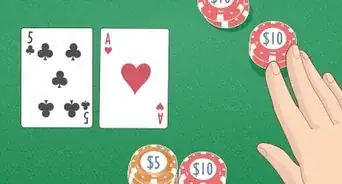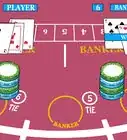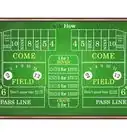wikiHow is a “wiki,” similar to Wikipedia, which means that many of our articles are co-written by multiple authors. To create this article, 28 people, some anonymous, worked to edit and improve it over time.
wikiHow marks an article as reader-approved once it receives enough positive feedback. In this case, 81% of readers who voted found the article helpful, earning it our reader-approved status.
This article has been viewed 472,643 times.
Learn more...
Baccarat is an elegant casino game often played by the richest of the high-rollers, and was often James Bond's card game of choice. It's an extremely dramatic game that involves placing blind bets on one of two outcomes--the Banker having the higher hand, or the Player. It takes some serious guts to play Baccarat, but you can learn the rules quite quickly and learn to start making smart, safe bets that'll have you ruling the table. See Step 1 for more information.
Steps
Learning the Rules
-
1Understand how the cards are dealt. In Baccarat, two hands are dealt of two cards each, from a shoe, usually filled with eight decks of cards. One hand is called the Player hand and one hand is called the Banker hand. Any number of players can bet on the outcome of each hand, choosing either to bet that the Player hand or the Banker hand will be closer to nine.[1]
- The deal passes clockwise around the table between the betting parties, though players can elect to pass the shoe. The player dealing will deal out two cards and pass them to the table banker, usually a casino representative who is in charge of the chips. The first hand dealt is usually the Player hand and the second hand is usually the Banker hand.
- Sometimes, when the shoe is shuffled, the first card turned over will reveal how many cards the dealer should "burn" (toss away) in between deals for each hand. So, if the first card over is the 2 of Hearts, the dealer will burn two cards between each hand until the shoe is reshuffled.
-
2Learn how the cards are scored. Basically, the card values are added together to result in a score for each hand between 0 and 9. Suit is ignored. Face cards are each worth 10, Aces are worth 1, and all cards 2-9 are worth their face value. When the cards are added together, the digits in the tens places are dropped, making the ones place digit the score. In other words, face cards are essentially worth zero.[2]
- Say the Player hand reads 5 and 7. Since the sum of the cards is 12, the value of the hand 2. It's impossible to "bust" or go over in Baccarat, like in Blackjack, though hits are guided by a particular set of rules.[3]
- In the event of a tie, the hand is passed and the bets are returned and the hand is redealt.
Advertisement -
3Understand how hits work for the Player. A third card will be drawn for the Player hand and the Banker hand under the following conditions:
- If either hand reads 8 or 9, both hands must stand. This rule overrides any other guidelines for hits.
- If the Player hand reads 5 or less, the Player takes a hit. The Player card will be hit first in the rotation.
-
4Learn when the Banker takes a hit. If the Player stands (because the hand reads 6 or higher), the Banker takes a hit on hands that read 5 or less. If the Player hits, it depends on the value of the Player's hit card and the Banker's score.[4]
- If the Player’s third card is 9, 10, face-card or Ace, the Banker draws when he has a 0-3, and stays with a 4-7.
- If the Player’s third card is 8, the Banker draws when he has a 0-2, and stays with a 3-7.
- If the Player’s third card is 6 or 7, the Banker draws when he has a 0-6, and stays with a 7.
- If the Player’s third card is 4 or 5, the Banker draws when he has a 0-5, and stays with a 6-7.
- If the Player’s third card is 2 or 3, the Banker draws when he has a 0-4, and stays with a 5-7.
- At most casinos, the Banker at the table will call for extra cards according to these rules. Much like roulette, the only decision you've got to make in a game of Baccarat is whether or not you bet on the Banker or the Player, then the cards are controlled by the dealer and the table banker. It's good to know these rules, but not essential to play.
Making Smart Bets
-
1Learn the odds. Playing Baccarat is a lot like a super-sophisticated and classy version of betting on coin tosses. You're betting blind, essentially, deciding to put a sum of money on either the Banker hand or the Player hand before the cards have been dealt. It's part of what makes the game exciting, dramatic, and unpredictable. You can't really sway the cards with strategy, which makes the game popular among high-rollers.
- Practically-speaking, the odds favor the house but only slightly in an 8-deck shoe: 1.06% on the banker bet, 1.24% on the player bet.[5]
-
2Keep track of your wins. Often, casinos will provide players with a scorecard to keep track of their wins on particular hands. Since the game exists over many hands, learning to develop a strategy of betting and alternate between a pattern and breaking your own pattern is a good way to win money in the long haul.
- Mark whether or not you bet Banker or Player and place a check mark next to your correct calls. Watch for patterns to develop. Follow them. Feel the board and the way the game seems to be swinging and place your bets accordingly.
- To maximize fun while minimizing your risk of losing big, bet the lowest possible sums of your money.[6]
-
3Bet runs. Betting Baccarat is much more instinct than science. Traditional wisdom, especially in online Baccarat, suggests that you shouldn't break a run. In other words, if you're betting Player and the Player continues winning, don't start betting Banker. Stick with a strategy and bet consistently. If the pattern switches, switch. If you make a few hasty switches, try to stick it out. Learn to adapt to the flow of the game and stay in it for the long run.
- Baccarat isn't typically a game that people only play for a few hands and move elsewhere. Baccarat is typically a game played by big betters with particularly high table minimums, who'll play for several hours, letting lots of money change hands.[7] Often, the game is even roped off from the rest of the casino. Bring as much money as you can safely, comfortably afford to lose and plan on investing enough time and money into the game to make it worthwhile.
-
4When in doubt, bet on the Banker. Traditionally, it's customary for the player dealing to always bet Banker and to continue dealing until the Banker loses. Even if you're not dealing, however, it's usually the safest bet to go with the house odds and bet for the banker. While there's no strategy to the card-play itself between the Banker hand and the Player hand, there's still a slight numbers advantage that can work in your favor.[8]
-
5Calculate how much money you are willing to lose. A lot of money can change hands very quickly in Baccarat. Decide on a set amount you're willing to play to win and get out while you're ahead. Like any game of chance, it's difficult to ride a successful streak for very long, so make your money and get away clean.
- Again, often the table will enforce betting minimums and often those betting minimums are quite high for Baccarat. Check out the game and understand the specific house rules before you sit down and play your chips.
-
6Go with your gut feeling. In Baccarat, the science only goes so far. You can't read the hand, so feel free to play as superstitiously as you want, as loose as you want, and have fun. Like craps, the guy who wanders into the game for the first time and doesn't know what he's doing typically has the most fun and wins the most money. The seasoned vet grimly placing bets and over-thinking it is the one doing all the losing.
Community Q&A
-
QuestionHow do I quit while ahead when gambling?
 Community AnswerMake up your mind before you start gambling that you will stop at a certain point. For example; if you would be happy with $1000, make that your point and as soon as you reach that number, quit.
Community AnswerMake up your mind before you start gambling that you will stop at a certain point. For example; if you would be happy with $1000, make that your point and as soon as you reach that number, quit. -
QuestionWhat should I do about card counting?
 Community AnswerYou can't count cards in Baccarat. Most casinos use eight decks, making card counting useless.
Community AnswerYou can't count cards in Baccarat. Most casinos use eight decks, making card counting useless. -
QuestionIs progressive betting a good idea?
 Gary KidgellCommunity AnswerI use progressive betting, usually starting at $50, then $100, $200, and $400. It's very important to control after $400. Your next progressive bet would be $800 to make money back, plus $50. If you bet on banker, your commission is $40, so your profit is only $10 -- not worth the risk. If you do proceed and lose the $800, you're in the hole $1550 -- too much to come back in the shoe or even another game. It's best to stop at $400 when progressive betting, or start at a lower denomination, like $10 or $25.
Gary KidgellCommunity AnswerI use progressive betting, usually starting at $50, then $100, $200, and $400. It's very important to control after $400. Your next progressive bet would be $800 to make money back, plus $50. If you bet on banker, your commission is $40, so your profit is only $10 -- not worth the risk. If you do proceed and lose the $800, you're in the hole $1550 -- too much to come back in the shoe or even another game. It's best to stop at $400 when progressive betting, or start at a lower denomination, like $10 or $25.
Warnings
- Don't waver from the amount of money you know you can afford to lose, and know when to quit playing baccarat.⧼thumbs_response⧽
References
- ↑ https://www.pagat.com/banking/baccarat.html#information
- ↑ https://www.pagat.com/banking/baccarat.html#information
- ↑ http://wizardofodds.com/games/baccarat/
- ↑ https://thepogg.com/guides/baccarat/
- ↑ https://thepogg.com/guides/baccarat/
- ↑ https://casino.guru/Strategy-for-playing-Baccarat-Punto-Banco
- ↑ https://www.forbes.com/sites/davidschwartz/2018/06/21/why-casinos-love-and-fear-baccarat-the-worlds-biggest-gambling-game/#677ce8e34188
- ↑ https://casino.guru/Strategy-for-playing-Baccarat-Punto-Banco
About This Article
To win Baccarat, start by betting on 1 of the 2 face-down hands that are dealt, either the player hand or the dealer hand. Then, if the hand you bet on ends up being closer to 9 than the other hand, you win! In Baccarat, face cards are worth 10, aces are worth 1, and the rest of the cards are worth their face value. If the cards in a hand add up to over 9, the number in the tens place is dropped, and only the number in the ones place counts. To learn how to make strategic bets in Baccarat, scroll down!





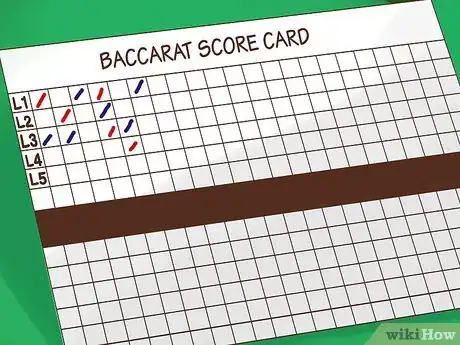
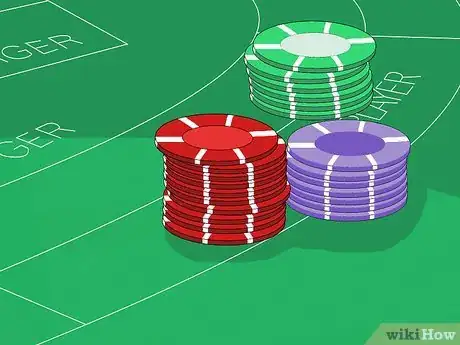

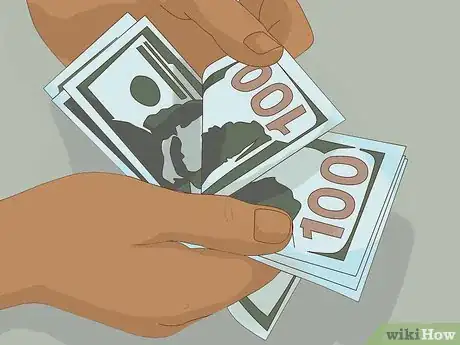




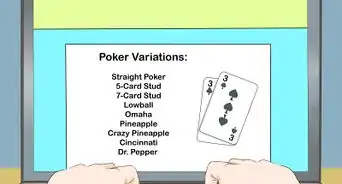


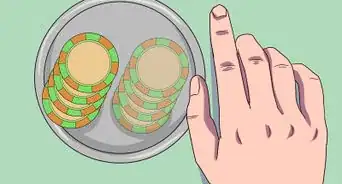
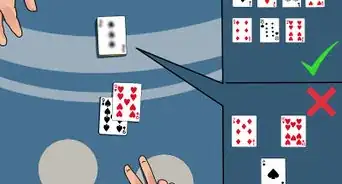
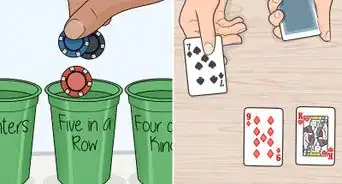
-Step-25.webp)
